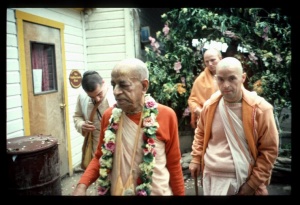SB 5.4.11-12

A.C. Bhaktivedanta Swami Prabhupada
TEXTS 11-12
kavir havir antarikṣaḥ
prabuddhaḥ pippalāyanaḥ
āvirhotro 'tha drumilaś
camasaḥ karabhājanaḥupaśamāyanam upariṣṭād varṇayiṣyāmaḥ.
SYNONYMS
kaviḥ—Kavi; haviḥ—Havi; antarikṣaḥ—Antarikṣa; prabuddhaḥ—Prabuddha; pippalāyanaḥ—Pippalāyana; āvirhotraḥ—Avirhotra; atha—also; drumilaḥ—Drumila; camasaḥ—Camasa; karabhājanaḥ—Karabhājana; iti—thus; bhāgavata-dharma-darśanāḥ—authorized preachers of Śrīmad-Bhāgavatam; nava—nine; mahā-bhāgavatāḥ—highly advanced devotees; teṣām—of them; sucaritam—good characteristics; bhagavat-mahimā-upabṛṁhitam—accompanied by the glories of the Supreme Lord; vasudeva-nārada-saṁvādam—within the conversation between Vasudeva and Nārada; upaśamāyanam—which gives full satisfaction to the mind; upariṣṭāt—hereafter (in the Eleventh Canto); varṇayiṣyāmaḥ—I shall vividly explain.
TRANSLATION
In addition to these sons were Kavi, Havi, Antarikṣa, Prabuddha, Pippalāyana, Avirhotra, Drumila, Camasa and Karabhājana. These were all very exalted, advanced devotees and authorized preachers of Śrīmad-Bhāgavatam. These devotees were glorified due to their strong devotion to Vāsudeva, the Supreme Personality of Godhead. Therefore they were very exalted. To satisfy the mind perfectly, I [Śukadeva Gosvāmī] shall hereafter describe the characteristics of these nine devotees when I discuss the conversation between Nārada and Vasudeva.